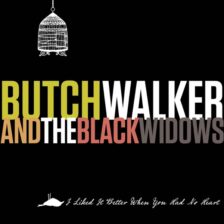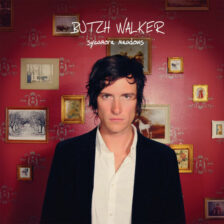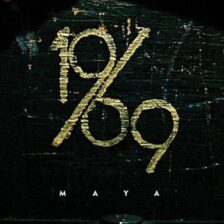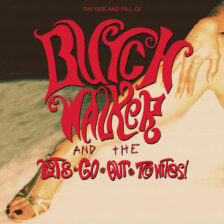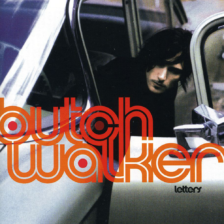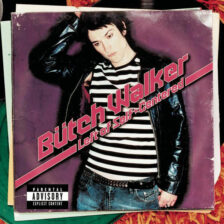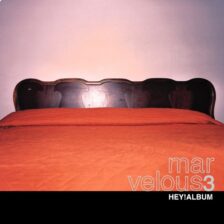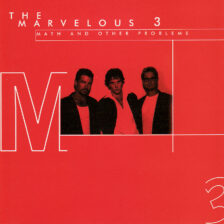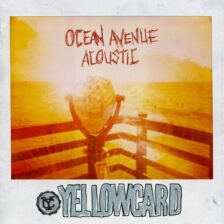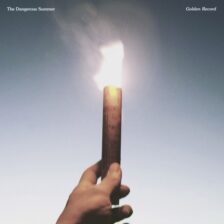When Butch Walker released Sycamore Meadows in 2008, it felt like both a new beginning for him and the end of an era. Walker’s house had burned to the ground the year before, and he spent the songs on Sycamore reinventing his sound and injecting more layers of classic rock, folk Americana, and country twang into his writing than ever before. The result was arguably his best record, but for those who had followed Butch from the Marvelous 3 days, or jumped aboard with his early solo power pop albums, hearing him as he got older, wiser, and softer was somewhat of a bittersweet transformation. The shows on the Sycamore Meadows tour were still as rafter-raising and life-affirming as ever, but they couldn’t mask the feeling I had that Sycamore was the ending of the southern California trilogy that had kicked off with Letters and continued with The Rise and Fall. Where Letters was an album about falling in love and falling apart on the west coast, and where much of Rise was concerned with the cathartic and communal backdrop of the L.A. party scene, Sycamore left the ashes of Butch’s life in Malibu, on the street where he used to live, and no matter how good the music sounded, there was no denying that the man behind it had changed. He was looking for something new.
Read More “Butch Walker – I Liked It Better When You Had No Heart”Review: Butch Walker – Sycamore Meadows
“I’m not happy with myself these days, I took the best parts of the script and I made them all cliche/And this red bandana’s surely gonna fade, even though it’s the only thing the fire didn’t take.”
Butch Walker sings those lines on “Going Back/Going Home,” one of the standout tracks from his fourth solo studio album, 2008’s Sycamore Meadows. That’s not a metaphorical fire, either. In November 2007, Walker lost his Malibu home, along with every guitar he’d ever owned and every master tape of every song he’d ever recorded, in a vicious assault of California wildfires. Pieces of recording equipment, cars, motorcycles, family heirlooms, photographs from happier times—they all turned to ashes on November 24 of that year. Luckily, Butch and his family were on tour in New York and no one was hurt, but the songwriter was suddenly cut adrift from all material possessions, forced to start over. The L.A. party of his previous record, 2006’s The Rise and Fall of Butch Walker and the Let’s-Go-Out-Tonites!, was more than over: it was a distant memory, a piece of another life. In his first public statement following the fire, Butch said “I feel like I finally know the difference between ‘going back’ and ‘going home.’” It wouldn’t be long before he would channel that sentiment into a song and album that were arguably career-defining moments for him.
Read More “Butch Walker – Sycamore Meadows”Review: 1969 – Maya
2008 was the most prolific year of Butch Walker’s career, a remarkable feat considering what was going on in the singer/songwriter’s personal life at the time (more on that in today’s other review). February brought the release of a terrific live album called Leavin’ the Game on Luckie Street, which had been recorded at a marathon Atlanta show the previous year. It wouldn’t be until November that Butch’s next proper solo album would drop, but in the meantime, fans were treated to the first (and thus far, only) side project in his discography. The album in question, called Maya, was released under the moniker of 1969 (Walker’s birth year) and features Butch on vocals, Michael Guy Chislett on lead guitar, and Darren Dodd on drums. Both Dodd and Chislett had played on Butch’s previous solo record, 2006’s The Rise and Fall of Butch Walker and the Let’s-Go-Out-Tonites, and Dodd would remain a core member of Walker’s band until 2011. Chislett, meanwhile, ended up joining up with scene favorites The Academy Is… after The Rise and Fall, playing on two of the band’s albums (the Walker-produced Santi and the pop-heavy swansong, Fast Times at Barrington High) before they called it quits.
Read More “1969 – Maya”Review: Butch Walker – The Rise and Fall of Butch Walker and the Let’s-Go-Out-Tonites!
For a long time, I’ve thought that The Rise and Fall of Butch Walker and the Let’s-Go-Out-Tonites! was the most overlooked album in Butch Walker’s discography. Maybe that’s because it was the first Butch album that came out after I had become a die hard fan, and was, as such, probably the most I’ve ever anticipated an album. Or because Butch doing glam rock (and making incredibly obvious David Bowie references) produced the most exciting live set I think I’ve ever seen him play. Or maybe the underrated feel I get from this record is the result of the vast majority of these songs never showing up on “favorite” lists when I chat with other Butch fans. Whatever the reason, The Rise and Fall doesn’t get a lot of talk, and it never has. After this record started landing in fan mailboxes in early July 2006, many of the places that had reviewed Letters favorably stayed silent; one of my fellow bloggers, a guy who loves Butch every bit as much as I do, hardly mentioned the album at all until 2009, when it was one of the records Butch played in full during his winter “residency” concerts that year; and pretty much every Butch fan I’ve met on this very site will wax poetic on Letters or Sycamore Meadows, but will seemingly pretend that this album doesn’t exist.
Read More “Butch Walker – The Rise and Fall of Butch Walker and the Let’s-Go-Out-Tonites!”Review: Butch Walker – Letters
Letters is the best album of the past ten years, and the best album of the millennium thus far. How’s that for kicking off today’s installment of my “Butch Walker Week” coverage with a bit of hyperbolic praise? Except that I don’t think it’s a hyperbolic statement at all, nor do I think there is a record on the planet—with the possible exception of Born to Run—that has meant more to me in my life than this one. So far with Butch Walker Week, I’ve discussed four great records and dozens of terrific songs, music that I love and hold very near and dear to my heart. Letters blows all of that away in 14 songs and 50-some minutes of the most stunning and mature music that Walker has ever made. To date, Letters is the most cohesive record in the Butch Walker discography. It’s a stunningly gorgeous and sinfully catchy portrait of heartbreak and love on the west coast, sequenced perfectly to represent the ups and downs of a relationship. It’s lyrically brilliant and loaded with hooks, beautifully written and arranged to take advantage of fuller instrumental textures than ever before. The production is lush and enveloping, quite possibly my favorite example of studio work on any record that has ever graced my ears. And Butch’s flawless vocal performance towers above the whole thing, wrapping these songs in grand emotion, laugh-out-loud sarcasm, subtle sadness, and euphoric grandiosity; he has never sounded better.
Read More “Butch Walker – Letters”Review: Butch Walker – Left of Self-Centered
“Just think, with Rock Vocal Power, you’ll never have to sound like this guy again!”
It’s hardly surprising that Butch Walker’s debut solo album—titled Left of Self-Centered and released by Arista Records in 2002—opens with a fair dose of sarcasm, cynicism, and self-deprecation. The above line comes from “Rock Vocal Power,” the introductory spoken-word track that kicks off the album. The song is satire, playing like a mock infomercial for an instructional audio series that can turn you into a famous rock singer for just six easy installments of $69.95(!) Butch makes fun of well-known and oft-imitated rock frontmen by offering to reveal their secrets (like Eddie Vedder’s “pickle-in-mouth technique,” or Kidd Rock’s “ever-popular hey-look-at-me-I-can’t-sing-so-run-me-through-the-computer” maneuver), and a fake Scott Stapp (the Creed guy) even provides a laugh-out-loud testimonial about going from a “bar singer playing Pearl Jam covers” to the frontman of his own original music band, all thanks to the series. The line quoted above is the final part of the comedy number, acting perfectly as a fade-in to the proper album opener (an energetic, sing-along rocker called “My Way”), and even years later, the bit is still pretty funny because its music-industry-oriented jokes have yet to go out of date. Unorthodox as it is in the opening slot, “Rock Vocal Power” is a patent Butch Walker number, a reminder of both how fickle the music industry is and of Butch’s refreshing decision as a performer to never take himself too seriously.
Read More “Butch Walker – Left of Self-Centered”Review: Marvelous 3 – ReadySexGo
When Elektra Records picked up the Marvelous 3 and released Hey! Album as a major label debut in 1998, they thought they were signing a hit act. After all, the flagship single from that album, the mercilessly hooky “Freak of the Week,” had done quite well for itself as an independent release, notching near-ubiquitous airplay on the band’s local Atlanta radio stations and earning the Butch Walker-fronted power-pop-rock trio a passionate fanbase. But the wider mainstream audience wasn’t really ready for the catchy, idiosyncratic sound of Marvelous 3, which blended biting sarcasm, bitter lyrics about failed relationships, and easy-to-swallow melodies together into a unique concoction. Instead, the radio was turning toward boy bands and rap metal, and as “Freak of the Week” failed to score a high chart position, Elektra realized that they had signed anything but a hit pop act; they had signed a band that, in that age of pop music, wasn’t marketable to the average radio audience. At all.
Read More “Marvelous 3 – ReadySexGo”Review: Marvelous 3 – Hey! Album
In the first installment of Butch Walker Week, I wrote that Math and Other Problems, the debut album from Walker’s 1990s power pop trio, the Marvelous 3, felt like a half-formed statement from a band that was still very indebted to their influences. On Hey! Album, the group’s sophomore-record-turned-major-label-debut, the leap forward is almost remarkable. Don’t get me wrong, Walker and company don’t try that many new things here: it’s still a slick, catchy album full of punchy power pop songs and with a foot planted firmly in 1980s alternative rock. But instead of spending the whole record imitating his influences, Walker establishes himself here as full-throated rock ‘n’ roll frontman, with the charisma, the passion, and the songwriting ability to go the whole nine yards. Naturally, his band follows suit.
Read More “Marvelous 3 – Hey! Album”Review: Marvelous 3 – Math and Other Problems
In the years that followed the dissolution of the Marvelous 3, a 1990s one-hit wonder power-pop trio fronted by Butch Walker, Butch would often remark that his band was “15 years too late and five years too early.” After all, Walker and his bandmates—bassist Jayce Fincher and a drummer who was only ever known as “Slug” in the album liner notes (his real name is Doug Mitchell)—didn’t really fit in with the broody nineties crowd. There’s not a single iota of grunge in any of the three records Walker and the rest of the Marvelous 3 ever produced, nor is there anything akin to the boy-band/pop-princess radio fodder that was poised to take over the world as the decade and the millennium ground to a close. Instead, the guys in the Marvelous 3 were disciples of eighties hair metal and trashy pop-rock songs, with a fair amount of classic glam and singer/songwriter mentality thrown in for good measure. Those influences probably meant the band was straight fucked from the moment they signed with Elektra Records, a label that became known for screwing over similarly-minded pop-rock acts (Third Eye Blind and Nada Surf, for example) before they ran out of money and went bust in the face of the Napster revolution. But for a few years at least, the Marvelous 3 got to act like rock stars, and in the process, they produced three of the finest power pop records of the past 20 years. 1997’s Math and Other Problems was the first.
Read More “Marvelous 3 – Math and Other Problems”Review: Yellowcard – Ocean Avenue (Acoustic)
Welcome back to another round of the AP.net Roundtable – an article revolving around a much-anticipated album and the discussion it inspires amongst a handful of staff members. Today’s roundtable article features Jason Tate, Craig Manning, Ryan Gardner, Cody Nelson and myself discussing Yellowcard’s latest release, Ocean Avenue Acoustic. Throughout the discussion we touched on which renditions were executed the best, favorite moments on the release, and why this album has affected so many pop-punk fans. So pick up your copy of Ocean Avenue Acoustic, put the needle down, and check out the latest AP.net Roundtable discussion in the replies. – Drew Beringer
Read More “Yellowcard – Ocean Avenue (Acoustic)”Review: John Mayer – Paradise Valley
Tell a bunch of people you meet at a party that John Mayer is one of your favorite songwriters, and you may get a few curt nods, perhaps even one or two wide-eyed declarations of agreement, but quite often, you will see rolled eyes and barely restrained scoffs instead. Whether a result of the off-putting public persona Mayer was putting forth a few years ago or a lingering disrespect for the artist’s early pop radio hits, I have found that a lot of people still dismiss John Mayer as an asshole, a playboy, and a mediocre songwriter. I can’t claim to have met the man and wouldn’t presume to make accusations in the first two categories, but I have always found it strange that my friends and family members don’t share so much as a fraction of my adoration for Mayer’s musical output, especially because he has proven himself to be so much more than just the twenty-something heartthrob that sang “Your Body is a Wonderland” on MTV over a decade ago.
Read More “John Mayer – Paradise Valley”Review: The 1975 – The 1975
I feel as though every year or so a new band hits my ears that forces a sharp reflection and virtually recalibrates my tastes. It’s that band that defines the year for me. That band that I look back on as the crack that splintered my tastes and musical habits into a spider-web of new directions. I think of artists like Blink 182, The Format, Brand New, Thrice, The Gaslight Anthem, Bon Iver, and P.O.S. Bands that have become pillars of my musical collection and ones I would point to as defining my “taste matrix.” These bonds have lasted for years and each listen to their catalog transports me back in time. These are the bands that I take possession of and metaphorically hang my hat on. That I say: “this is the band that defines this part of me; this is the band that I believe in.”
In 2013, that band is The 1975.
Read More “The 1975 – The 1975”Review: The Dangerous Summer – Gold Record
I bet you weren’t expecting to see this name on the byline. No doubt some, if not most of you have seen the tweets, posts, threads, etc. chronicling the turmoil of The Dangerous Summer between themselves, their fans, and sometimes this very website. And I’ll be honest – even a month ago I wouldn’t have believed I’d be writing the review for the band’s latest release, Golden Record. I’ve always been a fan of the band’s music (War Paint was in heavy rotation during the summer of 2011), but the antics and weird shit that went on turned me off to the band. But sometimes a simple post from the offending party can act as an olive branch and you reevaluate things. Hey man, music mends broken hearts and it can also rebuild bridges.
Read More “The Dangerous Summer – Gold Record”Review: City and Colour – The Hurry and the Harm
A corridor of darkness wraps around my car as it shoots down some county two-line road on the backstreets of town. There’s no one else around, no one but me, my blue beater of a Chevrolet, and the sounds pouring out of my stereo. It’s the summer of 2008, my first summer with a car, my first summer since my siblings moved out, my first summer with any semblance of freedom or responsibility, and it’s both the best and worst season of my life. I’m driving home from work at a job I hate and it’s midnight. I could call my friends and see what they’re doing, but chances are that most of them have either stayed at their houses too late for their parents to let them leave or are too many drinks in to register my call. I could also call her: the girl who used to be my best friend, the girl I’ve spent the past six weeks falling for, head over heels, but I know she won’t answer either. So I let my phone lay dormant at my side and I just drive. I drive and I turn up the stereo, and I listen to the strains of an acoustic guitar and a desolate voice as they nourish my wounds or cut them deeper. Or maybe they’re doing both. Truth is, I’m not sure which side of the pain I’m on anymore. All I know is this: when I walk into my house tonight, I’ll immediately want to leave it. I’ll feel pathetic and lonely and miserable for spending another night alone in my bedroom, even if the actual “night” is already gone and going anywhere else right now would just be stupid. But in the 10 or so miles between my workplace and my front door, with the music coursing through me and the brisk night air flicking through my hair, I feel more alive than I’ve felt in weeks. This is my stronghold, my bulletproof vest, my Fortress of Solitude. So instead of turning right and driving straight home, I turn left and take the long way. These songs aren’t done with me yet.
Read More “City and Colour – The Hurry and the Harm”Review: The World Is A Beautiful Place & I Am No Longer Afraid To Die – Whenever, If Ever
Everything you need to know about Whenever, If Ever – the debut full length from The World Is A Beautiful Place & I Am No Longer Afraid To Die – is right there in the image gracing the album’s cover. It’s a snapshot of exuberance and carefree youth – the idea of jumping off a cliff into the unknown is met with I don’t give a fuck enthusiasm perfectly sums up the ten track record. Even the album title possesses that attitude.
Throughout Whenever, If Ever, The World Is A Beautiful Place & I Am No Longer Afraid To Die (you best believe I’m abbreviating the shit out of this name for the duration of this review) takes plenty of lefts in its music when you’re expecting rights. Post-rock tendencies are met with horns-aplenty and juxtaposed against incredibly catchy pop-punk-esque hooks. TWIABP’s thorough aggressiveness is exhilarating from beginning to end. The album’s sleepy intro, the two-minute “Blank #9,” is tasked with bringing what’s so endearing about TWIABP to life, as it leads into quirky guitar opening of “Heartbeat In The Brain” before the avalanche of instrumentation rushes into our ears.
Read More “The World Is A Beautiful Place & I Am No Longer Afraid To Die – Whenever, If Ever”